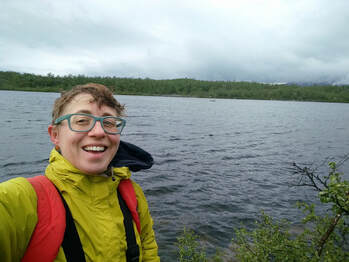
I am an Assistant Professor in the Department of Biology at West Chester University, where I lead the Aquatic Ecosystems Lab. Please visit our website for the most up to date information about my research, teaching, and other stuff.
My research program builds understanding human-influenced aquatic ecosystems. To do this, I combine techniques and ideas from ecology, biogeochemistry, hydrology. Through collaboration, I work to include the social sciences to understand these places as complex social-ecological systems.
As an educator, I work in collaboration with my students to build an atmosphere that promotes learning and mutual respect. I design active learning activities that build students' confidence understanding and applying the concepts, tools, and analyses of Ecology and Biology.
Before coming to West Chester University, I was a postdoctoral scientist at the Cary Institute of Ecosystem Studies, working to synthesize the rich 20 yr data sets collected by the Baltimore Ecosystem Study, in order to further our social-ecological understanding of urban streams and landscapes. Previously, I was an instructor in the Citizen Science program at Bard College and a postdoc with the Climate Impacts Research Centre at Umeå University, where my research sought to understand the impacts of environmental change on aquatic ecosystems in the Boreal and Arctic. I completed my PhD in 2017 in the Heffernan Lab at Duke University, where my research focused on dissolved organic matter (DOM): changes in its timing, composition, and amount and its fate and transport through the urban stream continuum.
More broadly, my approach to science is based using creativity to ask, develop, and answer interesting questions about how ecosystems work. I love collaborative research; I bring to the table a combination of experimental and observational approaches (including bioassays, high frequency sensors, optical DOM measurements, data synthesis, and others), multiple hypothesis testing, and conceptual development for ecosystem science.
My research program builds understanding human-influenced aquatic ecosystems. To do this, I combine techniques and ideas from ecology, biogeochemistry, hydrology. Through collaboration, I work to include the social sciences to understand these places as complex social-ecological systems.
As an educator, I work in collaboration with my students to build an atmosphere that promotes learning and mutual respect. I design active learning activities that build students' confidence understanding and applying the concepts, tools, and analyses of Ecology and Biology.
Before coming to West Chester University, I was a postdoctoral scientist at the Cary Institute of Ecosystem Studies, working to synthesize the rich 20 yr data sets collected by the Baltimore Ecosystem Study, in order to further our social-ecological understanding of urban streams and landscapes. Previously, I was an instructor in the Citizen Science program at Bard College and a postdoc with the Climate Impacts Research Centre at Umeå University, where my research sought to understand the impacts of environmental change on aquatic ecosystems in the Boreal and Arctic. I completed my PhD in 2017 in the Heffernan Lab at Duke University, where my research focused on dissolved organic matter (DOM): changes in its timing, composition, and amount and its fate and transport through the urban stream continuum.
More broadly, my approach to science is based using creativity to ask, develop, and answer interesting questions about how ecosystems work. I love collaborative research; I bring to the table a combination of experimental and observational approaches (including bioassays, high frequency sensors, optical DOM measurements, data synthesis, and others), multiple hypothesis testing, and conceptual development for ecosystem science.
|
Contact
Megan Fork Assistant Professor Department of Biology West Chester University mfork [at] wcupa [dot] edu Google Scholar Github |
